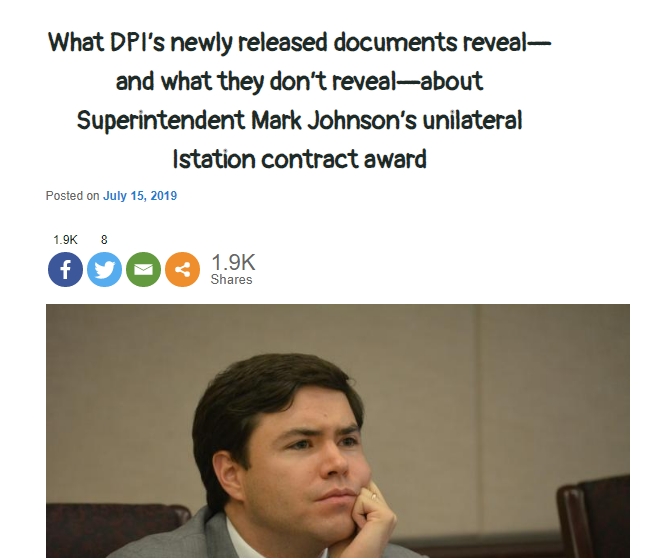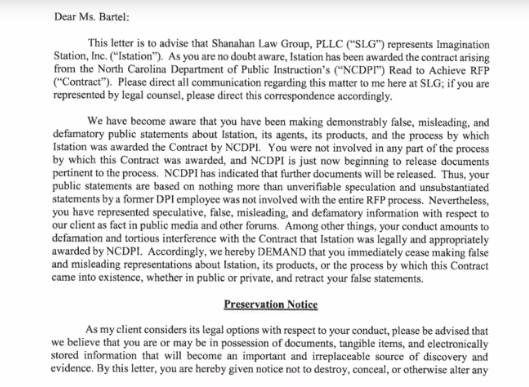So much for transparency.
Two articles were posted today online from both the News & Observer and WRAL.com that shed more light on the clouds that intentionally keep surrounding the iStation contract awarded unilaterally by Mark Johnson this past month.
Justin Parmenter’s also posted today on his blog Notes From the Chalkboard further explaining why so many in North Carolina are doubtful of how iStation received its contract. It keeps adding substance to the actual truth of what has been happening. It might be best to start with that.

And then when you are done with this post go and read Adrian Harrold Wood’s most recent posts from her Tales of an Educated Debutante Facebook page.
Parmenter talked about the release of documents in a public request for information released last Friday by DPI. It clearly showed that iStation was not the preferred vendor of the team put together at DPI to recommend a product to help with the Read to Achieve program.
Johnson has been fairly nebulous on his explanation of why DPI went against the committee’s recommendation of Amplify’s mClass product. Then this came out in the N&O’s article today (which references Parmenter’s most recent blog posts).
Graham Wilson, a spokesman for Johnson, said Monday that a whistleblower informed DPI that one of the committee members failed to disclose they had a prior business relationship with Amplify. Wilson did not identify the individual, who he said is no longer employed by DPI.
But Wilson said that person served on an earlier review committee that was disbanded in March 2018. That was not the later committee that recommended mClass.
This is the first time there happened to be a whistle-blower mentioned. The problem is that that whistle-blower incident was from a previous committee. And this quote is from an updated version of the N&O’s story. The original released version had this quote in it:
“While this employee’s failure to disclose was part of a canceled RFP (Request for Proposal), the Superintendent is pleased that the final decision resulted from a process that was fair and objective.”
To clarify, there have been three review committees that were been formed to review products related to Read to Achieve that involved Amplify’s mClass and iStation.
The first started in 2017 and worked into 2018. That was the one that was disbanded because of the incident with the whistle-blower and the person who was connected to Amplify.
The second committee to review products started in late 2018. That is the one which recommended mClass and is the one chronicled in the released notes from last Friday that Parmenter went through and reported on.
The third committee seems to be the phantom committee that has not had notes released on it as of yet, but from it Johnson supposedly made the decision to go with iStation.
But the statement made earlier today made it seem that the second committee was ruled tainted because of what happened in the first committee. In other words, Johnson didn’t like the second committee’s recommendation and redid it (with third committee) and in the public’s eye attempted to blame the “whistleblower” from the first time as the reason to negate a perfectly legit process used by the second committee.
The N&O’s report also references cease & desist letters being sent to people through the law office of Kiernan Shanahan on behalf of iStation.
Kieran Shanahan, an attorney representing Istation, has sent cease and desist notices to several critics of the new contract. In a statement Monday, Shanahan said those people are “misrepresenting Istation by making false, misleading and defamatory public statements” and are unfairly harming and maligning the company.
“Istation was legally and appropriately awarded the contract in North Carolina and has a proven record and reputation as an industry leader in early education assessments across the country,” Shanahan said. “The cease and desist notices provided are a lawful and appropriate starting point to end the misinformation, set the record straight, protect Istation’s interests, and let the state move forward.”
And then there is this:
In his statement, Shanahan also charges that a committee member may have been employed by Amplify.
Shanahan’s letter to “DEMAND” people to cease and desist referenced what happened in the first committee and made it seem like it was the legitimate reason for the second committee to have their recommendation nullified. (It also might be of interest to know that Shanahan is the finance chair of the NC Republican Party.)
WRAL’s post reported on the cease & desist letters as well and even named the people who received them.
The letters, which Shanahan’s office shared with WRAL News, do not cite any specific false, misleading or defamatory statements.
Amy Jablonksi, a former Department of Public Instruction staffer who is running for state superintendent, received her cease and desist letter on July 3. She led one of the committees that reviewed the companies competing for the contract and has criticized Johnson for “going against the advice” of educators and experts, which recommended Amplify over Istation.
In an in interview Monday, Jablonski called the cease and desist letters “an overt use of scare tactics that’s not OK to do.”
These were nonspecific cease & desist letters sent to three people which still reference an incident that never happened in that review committee that recommended mClass.
Jablonski is obviously one of the people who received a cease & desist letter.
According to the WRAL post, Parmenter received one today as well. As did …
Chelsea Bartel, a Triangle-based school psychologist, also received a cease and desist letter on Monday. She reached out to Istation on Twitter last month and asked for “peer-reviewed independent research studies on the validity of their assessment tool with a wide range of students.” When the company replied with links to research, she posted a 19-page review about the research.
Bartel even allowed WRAL to print her letter.

Jablonski, Parmenter, and Bartel have done nothing more than tell the truth based on what has been made available, asked for information when questions arose, and as public school advocates have reported in the hopes of shedding light on the truth.
And this cease & desist letter might be viewed by some as a scare tactic.
The rules of discovery cut both ways.

The definition of irony: Kieran Shanahan’s statement accompanying the cease and desist letters note that Read to Achieve has been a failure. He says: “After six years with no results in 3rd grade end of grade reading testing under North Carolina’s Read to Achieve Law, state leaders were right to demand a revamp of the program.” Of course, he tries to pin it on the software, not the initiative itself, as if simply switching up the software is going to make Berger’s albatross suddenly fly straighter.
I also think sending the same boilerplate letter to Chelsea Bartel is priceless, seeing as how her piece is based on the research that ISTATION SENT HER SUPPORTING ITS PRODUCT. She disagreed with the research and only asked a question about the selection process but Shanahan (glad you pointed out he is a GOP bigwig) accuses her of the same “misinformation”…IT’S WHAT ISTATION PROVIDED HER. SHE DIDN’T JUST MAKE IT UP!
Speaking of, what’s going on with this Istation fiasco – you can’t make it up!
LikeLike
Excellent – thanks for sharing. The research review by Ms. Bartel is terrific, too!
LikeLike